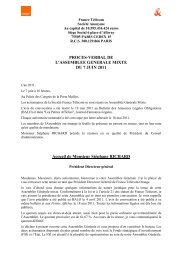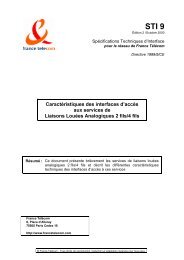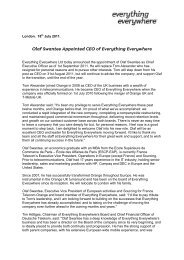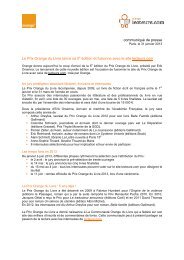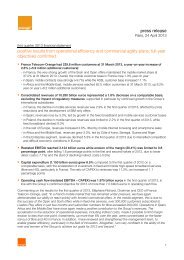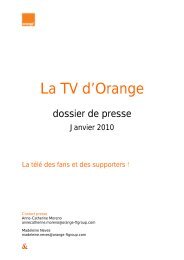registration document France Telecom 2009 - Orange.com
registration document France Telecom 2009 - Orange.com
registration document France Telecom 2009 - Orange.com
You also want an ePaper? Increase the reach of your titles
YUMPU automatically turns print PDFs into web optimized ePapers that Google loves.
financial information concerning the issuer’s assets and liabilities, financial position and profits and losses<br />
20<br />
NOTES TO THE ANNUAL FINANCIAL STATEMENTS OF FRANCE TELECOM S.A.<br />
State aid<br />
Three proceedings are currently pending before the European<br />
<strong>com</strong>petition authorities concerning alleged State aid in favor of<br />
<strong>France</strong> <strong>Tele<strong>com</strong></strong> :<br />
■ t he fi rst procedure follows an investigation opened in January<br />
2003 by the European Commission concerning the special<br />
French business tax (taxe professionelle) regime resulting<br />
from <strong>France</strong> <strong>Tele<strong>com</strong></strong> ’s historical legal status established by<br />
the French law of July 2, 1990, and to which the <strong>com</strong>pany<br />
was subject from 1991 to 2002. In its August 2, 2004<br />
decision, the European Commission stated that this regime<br />
was in<strong>com</strong>patible with the European Union Treaty and<br />
ordered the French State to recover from <strong>France</strong> <strong>Tele<strong>com</strong></strong><br />
an amount of aid that it estimated to be between 798 million<br />
euros and 1,140 million euros plus interest.<br />
In January 2005, <strong>France</strong> <strong>Tele<strong>com</strong></strong> lodged an appeal against<br />
this decision with the General Court of the European Union .<br />
For its part, the French State had fi led an equivalent appeal<br />
in October, 2004. On November 30, <strong>2009</strong>, the General Court<br />
of the European Union rejected these appeals. On February<br />
10, 2010, <strong>France</strong> <strong>Tele<strong>com</strong></strong> fi led an appeal with the European<br />
Court of Justice (ECJ) which the French government indicated<br />
that it intended to support.<br />
Pursuant to the 2004 decision of the European Commission<br />
and pending the General Court of the European Union<br />
decision, <strong>France</strong> <strong>Tele<strong>com</strong></strong> had placed in an escrow account<br />
in 2007 and 2008 the total amount of 964 million euros.<br />
Following the General Court of the European Union decision,<br />
<strong>France</strong> <strong>Tele<strong>com</strong></strong> recorded a charge of the same amount in its<br />
<strong>2009</strong> fi nancial statements. In addition, pursuant to the escrow<br />
agreement, on January 7, 2010, <strong>France</strong> <strong>Tele<strong>com</strong></strong> transferred<br />
to the French State the amount in escrow together with<br />
53 million euros of interest on the amount as of November<br />
30, <strong>2009</strong> and not recognized as in<strong>com</strong>e, representing a total<br />
amount of 1,017 million euros;<br />
■ t he second procedure also follows an investigation opened<br />
by the European Commission in January 2003, relating<br />
to the fi nancial measures announced by the French State<br />
on December 4, 2002. On that date, the French State<br />
announced that it was prepared to extend a shareholder’s<br />
loan to <strong>France</strong> <strong>Tele<strong>com</strong></strong> in advance of its participation in a<br />
capital increase alongside private investors. This shareholder’s<br />
loan was never actually put in place. In 2004, the European<br />
Commission found that these fi nancial measures were<br />
in<strong>com</strong>patible with the <strong>com</strong>mon market but did not require any<br />
repayment of State aid. The French State and <strong>France</strong> <strong>Tele<strong>com</strong></strong><br />
but also Bouygues <strong>Tele<strong>com</strong></strong> and the French association of<br />
network operators and tele<strong>com</strong>munications services (AFORS<br />
<strong>Tele<strong>com</strong></strong>) lodged appeals against the Commission’s decision<br />
before the General Court of the European Union . The hearings<br />
before the General Court of the European Union occurred on<br />
April 22, <strong>2009</strong> and its decision is expected during the fi rst<br />
half of 2010. The General Court of the European Union might<br />
conclude that the fi nancial measures constitute a State aid<br />
which is reimbursable and ask the European Commission to<br />
rule consistently with this position. However, <strong>France</strong> <strong>Tele<strong>com</strong></strong><br />
believes that the participation of the French State, in its<br />
capacity as a majority shareholder, in the <strong>com</strong>pany’s action<br />
plan was consistent with the conduct of an informed private<br />
investor and contained no element of State aid;<br />
■ o n May 20, 2008, the European Commission announced<br />
that it had launched a formal investigation into the pension<br />
plan for French civil servants employed by <strong>France</strong> <strong>Tele<strong>com</strong></strong> .<br />
This step follows a <strong>com</strong>plaint from Bouygues <strong>Tele<strong>com</strong></strong> in<br />
2002.<br />
The objective and effect of the pension plan implemented<br />
by the French law of July 26, 1996 was to bring the<br />
financing of the pension plan for French civil servants<br />
employed by <strong>France</strong> <strong>Tele<strong>com</strong></strong> into line with pension<br />
plans applicable to employees of <strong>France</strong> <strong>Tele<strong>com</strong></strong> ’s<br />
<strong>com</strong>petitors. As part of the new regime established by the<br />
1996 law, <strong>France</strong> <strong>Tele<strong>com</strong></strong> made an exceptional payment<br />
of 5.7 billion euros to the French State in 1997 and, since<br />
then, has made annual contributions in full discharge of<br />
its liabilities.<br />
<strong>France</strong> <strong>Tele<strong>com</strong></strong> believes that the sole effect of the pension<br />
plan system established in 1996 is to release the <strong>com</strong>pany<br />
from a structural disadvantage and that this reform contains<br />
no element of State aid. The <strong>com</strong>pany made observations as<br />
a third party interested in the proceedings.<br />
Broadband, High Capacity Broadband<br />
and Contents<br />
■ In July 2003, following a sector inquiry on the conditions for<br />
unbundling the local loop and providing access to broadband<br />
Internet services in the European Union member states, the<br />
European Commission ordered Wanadoo to pay a fi ne of<br />
10.35 million euros for abuse of a dominant position between<br />
March 2001 and October 2002. On January 30, 2007, the<br />
General Court of the European Union upheld this decision<br />
and on April 2, <strong>2009</strong>, the ECJ dismissed <strong>France</strong> <strong>Tele<strong>com</strong></strong> ’s<br />
appeal. The decision of the European Commission thus<br />
became fi nal.<br />
This decision of the European Commission and decisions<br />
from the French Competition Authority condemning similar<br />
practices of <strong>France</strong> <strong>Tele<strong>com</strong></strong> on the broadband access<br />
market served as a basis for several legal actions, which are<br />
currently pending before the Paris Commercial Court, from<br />
<strong>com</strong>petitors claiming <strong>com</strong>pensation for the damages they<br />
allegedly suffered because of these practices:<br />
■ Free, which brought an action against <strong>France</strong> <strong>Tele<strong>com</strong></strong><br />
in December 2006, accuses <strong>France</strong> <strong>Tele<strong>com</strong></strong> of having<br />
implemented a strategy that, between 2000 and 2002,<br />
prevented it from deploying ADSL and recruiting potential<br />
new customers to its narrowband Internet customer<br />
base, and which, from 2003 to 2005, hampered its<br />
development in this market. Free has asked the court<br />
to order <strong>France</strong> <strong>Tele<strong>com</strong></strong> to pay a provisional sum of<br />
500 million euros. In May 2008, in support of its claims,<br />
Free fi led an economic report which speaks of theoretical<br />
damages of 1.9 billion euros. In December 2008,<br />
<strong>France</strong> <strong>Tele<strong>com</strong></strong> produced an expert economic and<br />
fi nancial assessment which concluded that Free incurred<br />
no loss. <strong>France</strong> <strong>Tele<strong>com</strong></strong> believes that Free has been able<br />
to take full advantage of the development and dynamism<br />
of the French broadband market.<br />
■ Numericâble fi led a lawsuit against <strong>France</strong> <strong>Tele<strong>com</strong></strong> on<br />
November 9, <strong>2009</strong>. Numericâble submitted an economic<br />
report which values its prejudice at a minimum of 157 million<br />
<strong>2009</strong> REGISTRATION DOCUMENT / FRANCE TELECOM<br />
20<br />
513









